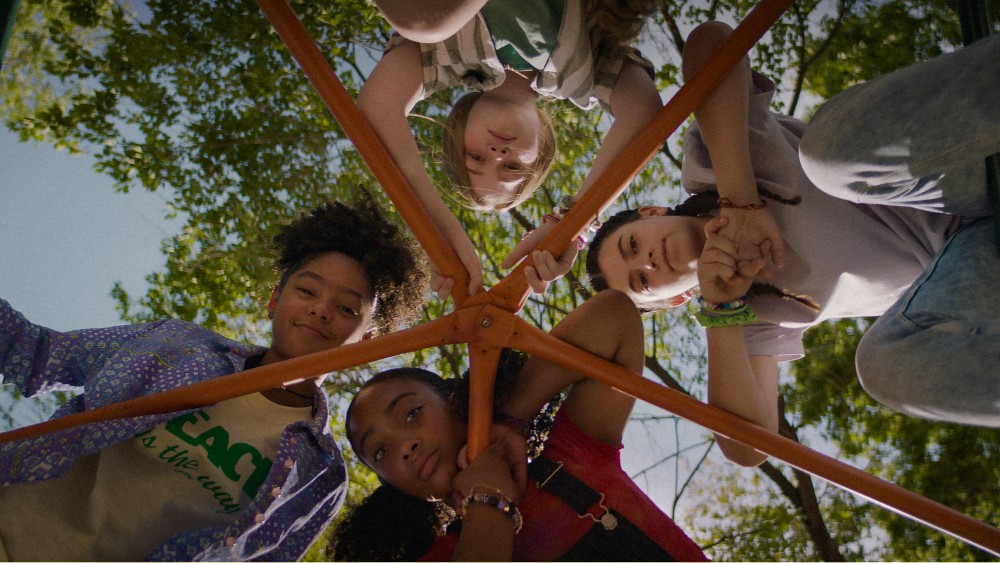
Filmmaker James Ponsoldt cut his teeth in the world of independent filmmaking with a number of highly-regarded movies that premiered either at Sundance or SXSW, beginning with his 2006 debut, Off the Black, and continuing through Smashed in 2012, The Spectacular Now in 2013, and The End of the Tour in 2015. (Ponsoldt’s 2017 movie, The Circle, broke up that run by premiering at Tribeca.)
Ponsoldt’s latest film, Summering, premiered at the virtual Sundance back in January, and follows four young tweenagers on the last day of summer before they start middle school. It’s a pivotal time in a young woman’s life when important friendships are made, and for Daisy (Lia Barnett), Lola (Sanai Victoria), Dina (Madalen Mills), and Mari (Eden Grace Redfield), this time becomes even more important to them when they discover the body of a dead man and go on an adventure to try to figure out who he is and what happened to him. The movie also stars Lake Bell, Sarah Cooper, Ashley Madekwe, and Megan Mullaly as the mothers of the four girls.
Below the Line hopped on Zoom with Ponsoldt to talk about his latest film and the challenge of making something that’s almost exclusively from a female perspective, at least in terms of the characters and storytelling.
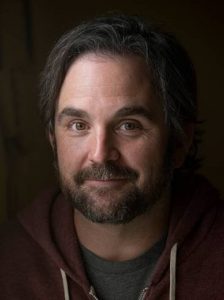
Below the Line: I’m not a therapist, but I’m sure it’s been pointed out that you only have two men in Summering, one is a corpse and the other is the drunk father who shows up briefly.
James Ponsoldt: And men in other rooms. There are voices from other rooms — there’s a dad passing by or a dad from a bathroom or a boss at a restaurant, who is in the other room. But yes, they’re all either not present or present, but not alive, as it were.
BTL: I assumed that was very deliberate. I was reading some of the reviews, and I’m not sure a lot of the critics got what you were doing, but I also got the impression this was a very personal film for you without anyone realizing it.
Ponsoldt: To make a story about female-centered friendship that really wants to understand the difference at a very specific age — at 11, 12 years old — what the difference between female friendship and male friendship. I mean, it is very personal for me, as someone who’s got kids. My wife works at a middle school and my sister is a social worker, who works with kids. I’m very close with my sister and mother. Those are things that have always fascinated me. My thesis film in grad school was about a single mother and daughter, [played by] Janeane Garofalo, and I have continued, obviously, to do movies and TV shows with female protagonists at different ages. It’s something that I think, if we’re interested in exploring structural issues related to violence, male toxicity, and all types of inequity, I think we have to make a space for female protagonists, and really try to get in and understand the emotional inner lives of those characters with real curiosity and empathy and specificity and not generalized.
We probably couldn’t count the number of movies that were a cast of just men, whether it was in the military or sports or a film noir or a story where there was just the quote unquote wife standing at home with the phone waiting for the call. There’s an endless barrage of that or of stories where a female body is used as a prop, as a device, where it’s in everything from film noir to Twin Peaks to the episode in Robert Altman‘s Short Cuts, where there is a female body that exists, either for men to solve a murder or men to save a woman or men to understand their own relationship with their mom or their dad, but that is not actually interested in the life of the woman. So yeah, it’s something that’s very personal and it was intentional in the film. Thank you for pointing that out, by the way.
BTL: You co-wrote this with another guy named Benjamin Percy. Is this the same guy who writes Wolverine and X-Force comics?
Ponsoldt: Yeah, it is. I mentioned my thesis film, which was 20 years ago, about a single mother and daughter– that’s part of a larger continuing conversation that I’ve been both exploring creatively and with collaborators. Ben and I met over 15 years ago. He was writing short stories at the time. He had written a short story called “Refresh Refresh” that was in the Paris Review. That was about young people and violence, and family structures as it relates to violence. I adapted that as a screenplay and went to the Sundance Screenwriters Lab with it, where I developed it with Atom Egoyan, John August, and other great writers, and then, a really amazing graphic novelist named Danica Novgorodoff adapted my script into a graphic novel that was then selected for Best American Comics in 2011 by Alison Bechdel.
Since then, [Ben and I] were talking about toxic masculinity and that story, which had young teenage male protagonists. I think that conversation has just continued, and our lives have sort of echoed each other. Both of us have similar family structures, that we’re both close with our mothers. We both have sisters that we’re close, we both have daughters., so I think a lot of the issues that are in the heart of this script are things that have been part of an ongoing conversation we’ve been having for over 15 years now.
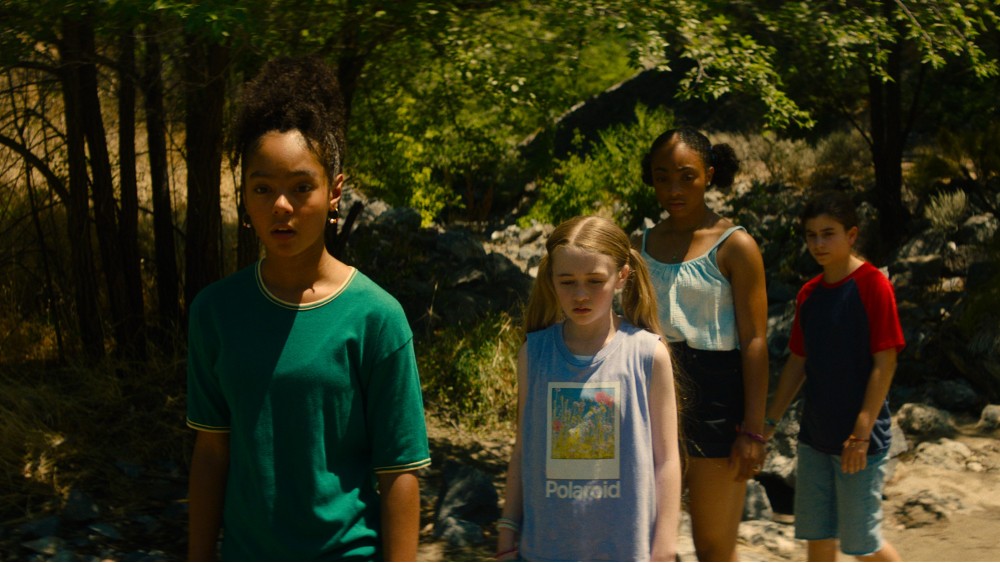
BTL: The movie has a timeless quality to it, where it’s not set in a specific period like the ’80s, though it harks back to things like Stand By Me or even Stranger Things, but there’s nothing that distinguishes it as taking place at any particular time, other than maybe the odd cell phone, which sets it in the last 15 years maybe. There also isn’t anything saying specifically where this takes place either.
Ponsoldt: In some ways, it was not unlike with The Spectacular Now, where I wanted to minimize the amount of technology. I wanted it to be realistic — kids have smartphones, they’re on their computers, they’re texting each other constantly. That is a thing, and will be more part of their life if these characters were older than if they were 11. But I didn’t want it to fetishize the object and be about the object. It’s not specifically about the relationship to technology.
And again, not unlike with Spectacular Now, I did grow up with those films in the 80s, but as I got a little bit older and was a hungry, teenage film nerd and watching things and looking for stories that echoed my own experience, I was looking to older films and films from other countries about young people and first brushes with death and mortality. In the case of this, there are films that I really love, like Spirit of the Beehive or Forbidden Games or Young Törless or Picnic at Hanging Rock, and then so many more modern films like Virgin Suicides and Fish Tank and things like that. I think there was a hope to have something that felt certainly specific to the people.
If you live in the part of Utah, where we shot this movie, outside Salt Lake City, mostly, in some of the suburbs like Midvale, it’s gonna feel hyper-specific. Spectacular Now, if you’re from Athens, Georgia, you will know every location, but I didn’t want it to just be film tourism. It wasn’t about the place. I think it was more about the experience of being a young person growing up in an area like that, where you don’t have the total freedom that an adult has to just come and go as you please. You’re not in the middle of nowhere, but you’re not in Manhattan, so there might be something exciting going on just over there, which is a feeling that I think a lot of people can relate to.
BTL: It reminded me of my own childhood in New England, hanging out with friends, although I’m not a girl, obviously. You’ve been developing this in some form or other for 15 years, and then you’re ready to make it, and COVID hits. Had you already started it at that point, or did COVID happen and then you had to figure out how to get it made?
Ponsoldt: We had started to go down the line in 2020 and got close-ish, which was that sort of spooky hard time to make things where I think a lot of people were making, quote, unquote, COVID films where it’s about Zoom chat. Ultimately, it was just too complicated and financially prohibitive. I mean, it’s a small movie for us to make it in 2020, but we persisted, and Jen Dana, who’s my producing partner on it, was just fearless and tireless and help really put it together and find a way to make a film that is essentially about four young people who are not like major movie stars.
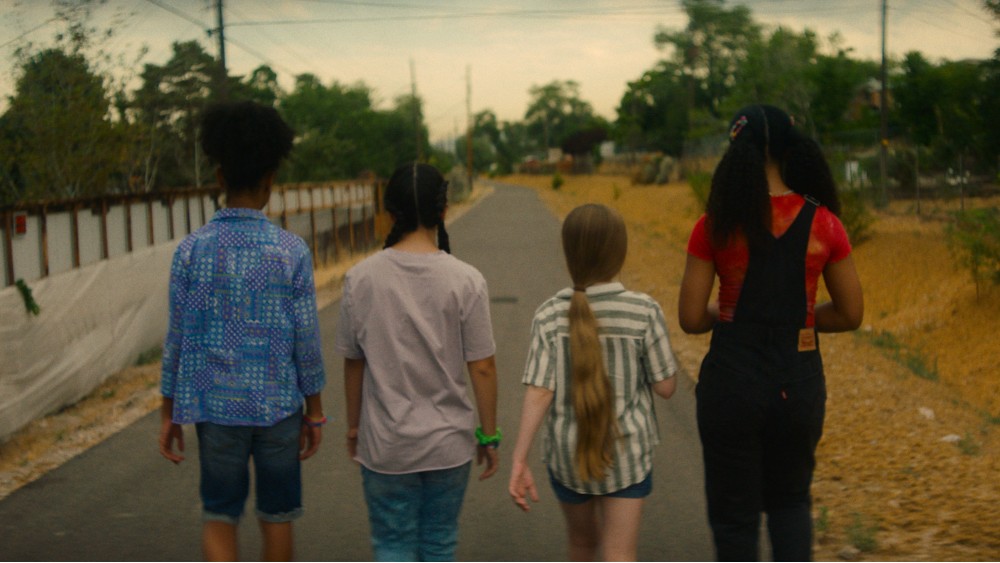
BTL: We have to talk about the casting. Obviously, you have Avy Kaufman, who is no slouch when it comes to casting. All the girls are pretty new, even though I may have seen Eden in a few things before. How do you put together a cast like this where chemistry between the characters is so crucial? How do you make sure these four important characters get along?
Ponsoldt: I’ve worked with Avy since my first film. Sometimes, like when I made the End of the Tour, it was two characters who were strangers to each other before they met, and in that case, like Jason and Jesse did not know each other so I did not want them to spend much time together before we shot. It was not important. In fact, I wanted to have them not spend time together and get comfortable with each other because the characters would not be. When I made Smashed with Aaron Paul and Mary Winstead, they were a couple that have been married for a while, so I really spent a lot of time with the two of them, trying to facilitate experiences that would become common.
In the case of these actors, they’re 11- and 12-year-olds; if they met at age six, that’s almost half their life. They really should feel like they’ve been a part of each other’s lives. When you’re casting older actors, you have reference points — you have TV shows, movies that you’ve seen them in. Sometimes, you know what they can do. With someone who is younger, there’s not as many of those, so there really is that sense of discovery that’s exciting. In some ways, it’s similar to what we went through for Spectacular Now. A great casting director, like Avy, is so good at advocating for the actors that she feels will serve the role, but are just interesting, who have wild imaginations, who you just love to watch. You feel like, “Man, they’re gonna grow up to be a really interesting adult.” That’s what I felt with Shailene Woodley or Kaitlyn Dever in Spectacular Now. That’s what I felt like with these four actors at the core of it.
We did zoom conversations and zoom auditions, and then we had them all hanging out together like in Zoom rooms, where maybe I would be there, and I assumed that I would be facilitating a conversation. But I realized within 30 seconds, that I didn’t need to. In fact, they were off to the races and finishing each other’s sentences with a real sense of intelligence and humor and political astuteness about the world around them, whether it’s social media, or how they’re being marketed to, or just all kinds of cultural issues. They had an amazing take on it that I found riveting, and that I was just eager to just listen to. I tried to listen a lot and just see if it was interesting to see them bounce off each other as people.
BTL: It’s kind of annoying how smart kids are today, compared to what we were like as kids. I see some kids today, and I know for a fact that I was not that smart when I was their age.
Ponsoldt: I mean, it’s interesting, right? In some ways, kids are bombarded with the internet that did not exist when I was the age of these characters. They have access to so much more in some ways, that can create a level of, at least superficial, sophistication and world weariness and cynicism, maybe. And then, there are some things that are just always… I mean, this is what I see with my kids. At the end of the day, the emotional inner life of a six-year-old, or an eight-year-old or an 11-year-old. There’s something timeless to what they’re going through. A lot of the fears and anxieties that they have, that might not seem rational to an adult. They can remember, “I was afraid of that thing that might have been in the closet.” You can just see that’s something that always will be.
I think recognizing that duality of both an innocence and a world-weariness at the same time is something that I find really interesting. The age of these characters–they’re not in high school, they’re not even in middle school yet, and they’re not all the same, They are four unique people who, depending on their own specific experiences with breakdowns in structures, familial or otherwise, or proximity to violence, they may or may not be less jaded. They might use their imagination more and have a world of fantasy that is more readily-accessible than they would if they were 16 or an adult or even a year later.
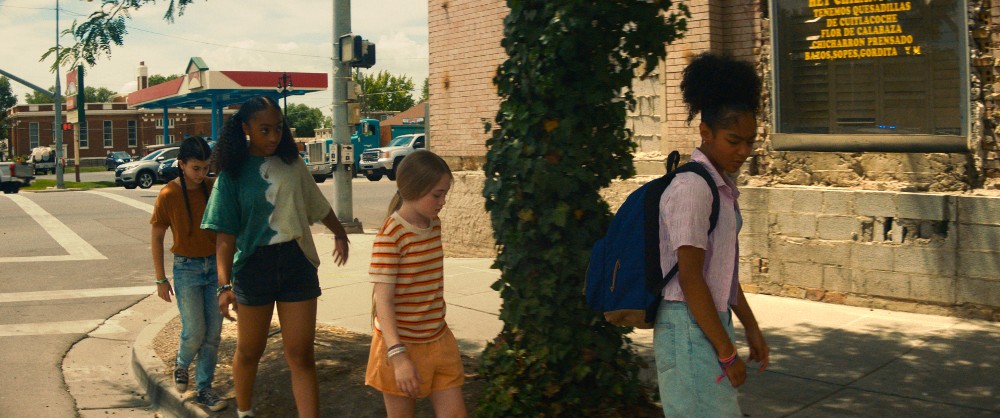
BTL: Did you bring some of the stuff you did with the actors on Zoom into the movie, even if it’s just about letting them ad-lib in characters for a few scenes that you ended up using?
Ponsoldt: Definitely. The script was sort of a living, breathing document that, as it was being written, it was being shared with all of my, both collaborators on the film – whether it was Avy or Jen Dana or Greta Zozula, the DP or Marie Schley, the costume designer, Tiffany Anders, the music supervisor, or Sofia Hultquist, the composer – but also female friends and family, who could offer a perspective on both what it was like for them when they were that age or for those that are parents, what their conversations are like, and the disconnect that they have with their kids now. We tried to like to listen, to recognize that, inherently, there are blind spots that will exist, that we all have, even with our best of intentions, we bring our own blind spots. So we tried to expose daylight to it as it were, and tried to let the script adapt.
These four young actors know much more about what it is to be 12 years old right now than I do or you do or other people do. I wanted their unique perspective, unique from each other. They’re very different people. So, yes absolutely. It was always, “How would you say this? What would you do? How do you feel?” Any number of questions that are both presented inside the film, and the conversations they have inside the film, and just larger things. It was always a conversation of, “How would you do this, and how would you say it?” Again, it’s pretty organic, because I am a parent with kids and my wife works at a school that starts in sixth grade, and every year, there’s new 11- and 12-year-olds. That’s our world.
BTL: Was Ben on set in case you wanted to make some changes or do some rewrites based on anything that may have been ad-libbed by the girls?
Ponsoldt: He came out for a little bit. He wasn’t able to be there for the whole shoot, but he and his family, and I feel more than other films I’ve been a part of a byproduct of making something during COVID, was how much this felt — and there were children, so it was necessary — but it felt like a family affair, where people, and also crew members, had their families there and that were around. I think larger questions related to equity, and living conditions and work conditions and what’s important, like all of those things were part of the conversation, both of what was inside the movie, and of all of us making it and trying to create a place that felt safe, where people felt valued and seen. It was summer 2021 when we made it. Much of the western United States was on fire. It was unbelievably hot, as it is right now, so we were asking all those questions, but Ben did come for some of it with his family. He has a daughter, that’s the exact age of these characters.
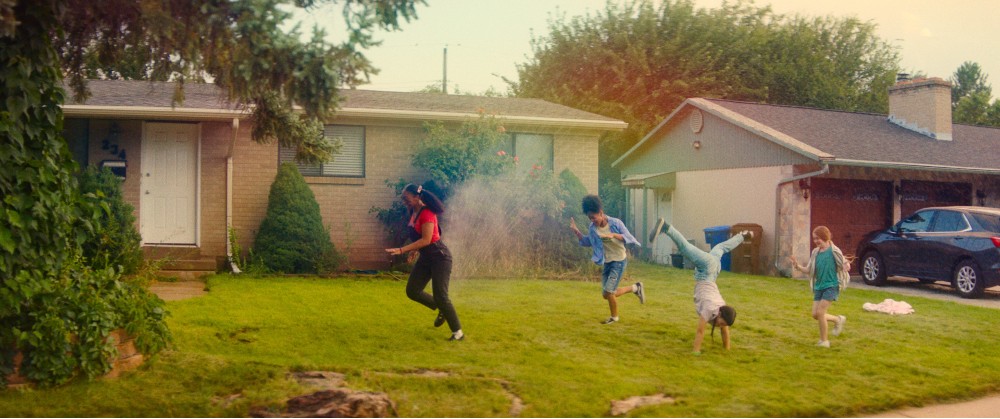
BTL: I’m glad you mentioned some of the below-the-line people, because this interview is for Below the Line. I’d love to know more about your DP Greta, who has worked her way up through camera on a number of Sundance movies, but this is your first time working with her, so how did you find her?
Ponsoldt: It was important to me, like with most of my department heads for this story, I wanted to have a female collaborator as a cinematographer, who would bring their own artistry to the position but also challenged my perspective and hopefully reveal blind spots that I have. Again, it’s not simply about gender. It’s the age of these characters. It’s us really trying to have a story that’s subjective to the experience of these four girls at this age, and how to visually tell that story. I had initially seen Greta’s work. It was at an Austin Film Society event years ago, sort of a filmmakers-screenwriters lab that iI was a mentor at that was held at Richard Linklater‘s home and. There was a mentorship component, but there was also a screening of a rough cut of a movie called Never Goin’ Back that Augustine Frizzell directed. She later did the Euphoria pilot, and Greta was the cinematographer who shot it.
I was one of the early people to see this really remarkable film, and I wondered who the cinematographer was. And then later, I saw amazing films like Light from Light and Materna, and The Half of It, which were all shot by Greta. There was a really great specific eye in all of them, but I think those films I just mentioned, are very different films. I think what struck me was a level of humanism and connection with the characters and empathy that I just felt. Part of that, inherently, is the cinematographer, so Greta’s collaboration was so vital. We really were partners, and because of COVID, and that it took a while to get the film made, we were in conversation. She lives on the East Coast, I’m on the West Coast. We just were talking for months and months and months about scenes and talking about films and images that were important to us and a value system. So, it was a real partnership.
BTL: On the other hand, you worked with your editor, Darrin Navarro, before. He edited Spectacular Now, and you did some TV stuff with him. You said you shot this in the summer of ’21, and it premiered at Sundance this past January 2022, which is not a huge turnaround. Were you able to work together in the same place to cut this movie?
Ponsoldt: A bit of both. We started working together on The Spectacular Now and did another film together. I’ve always admired his collaboration with other filmmakers like Azazel Jacobs, and things he did with William Friedkin. We did the Lizzie Olsen show, Sorry for Your Loss together, which I think was really meaningful. A lot of the themes of this related to family structures and female friendship came from conversations that we had during that show. Darrin is in Los Angeles, but much of it had to be separate, because of COVID protocols where he would post things, and I would watch them online, and then we would get on the phone, I would give notes.
Eventually, we were in the same space, in the same room, but a lot of it, even though we were 20 minutes from each other, were done remotely. It was a unique experience. I know other directors that have worked that way with editors they love, even before COVID. But it was a unique experience for me, especially given that I’ve had the opposite experience with Darrin. When we first started working together, we were just living in the editing room together all the time.
BTL: You mentioned Sofia earlier, and I’m always interested in movie music. How did you work with her? There’s a thriller element to the movie, but you didn’t go too far into that.
Ponsoldt: Sofia, who records as Drum & Lace, I knew a general energy that I wanted. I knew that I wanted something that felt like it was somewhat experimental electronic music that might have some organic elements in it like, like female voice, choral voice that became part of the sound of it. Those are very general terms. There wasn’t a specific composer that I had in mind, but I was really looking for someone that could combine electronic elements with female voice in a way that felt organic. I knew that I wanted it to feel like the soundscape of what the inside of these characters’ minds might feel like. In a world, both emotionally and in a world where they’re consuming all the music that kids would be consuming, all of that. Someone asked me, ‘Have you seen the show Dickinson?’ which I had not, and then I watched a couple episodes, which I really liked, and I thought the score was amazing, I immediately checked out all of the score, and it was remarkable.
It turned out that Sofia and I had mutual friends, so I reached out, and we decided to work together. It was an amazing collaboration. She had a lot of thoughts, both on the script and then in watching the first assembly of the film, and then the spotting session, which was really great. It was myself and Darrin and her, just going through the film and stopping it and talking about everything. I had the most general of ideas, kind of what I articulated to you, but I was excited to hear from her own experience. She connected a lot to these characters, both as someone who remembered her female friendships from that age, and she is a mother as well — I think she could connect to the story from both sides. Her ideas expanded my idea of what it could be.
I think the score, without being intrusive, sort of became a character in the film. It was a collaboration, from beginning to end, from conversations with my producer, Jen and my casting director, Avy and Greta, my cinematographer to Sofia and Tiffany, my music supervisor at the end at every stage. It was working with, in some cases, people I’ve worked with a lot – in some cases, it was new people – but who really connected emotionally to these characters and had their own stories to share about what it is to be 11 or 12 years old and feel like your best friend will clearly be your best friend for the rest of your life, which is what you think and feel, and the idea of losing that can be devastating. I learned a lot, and hopefully, so much of that, and their thoughts, feelings, emotions, their creative fingerprints, are in the film.
Summering isn’t currently playing in theaters, but it should be available on VOD and digital platforms soon.





